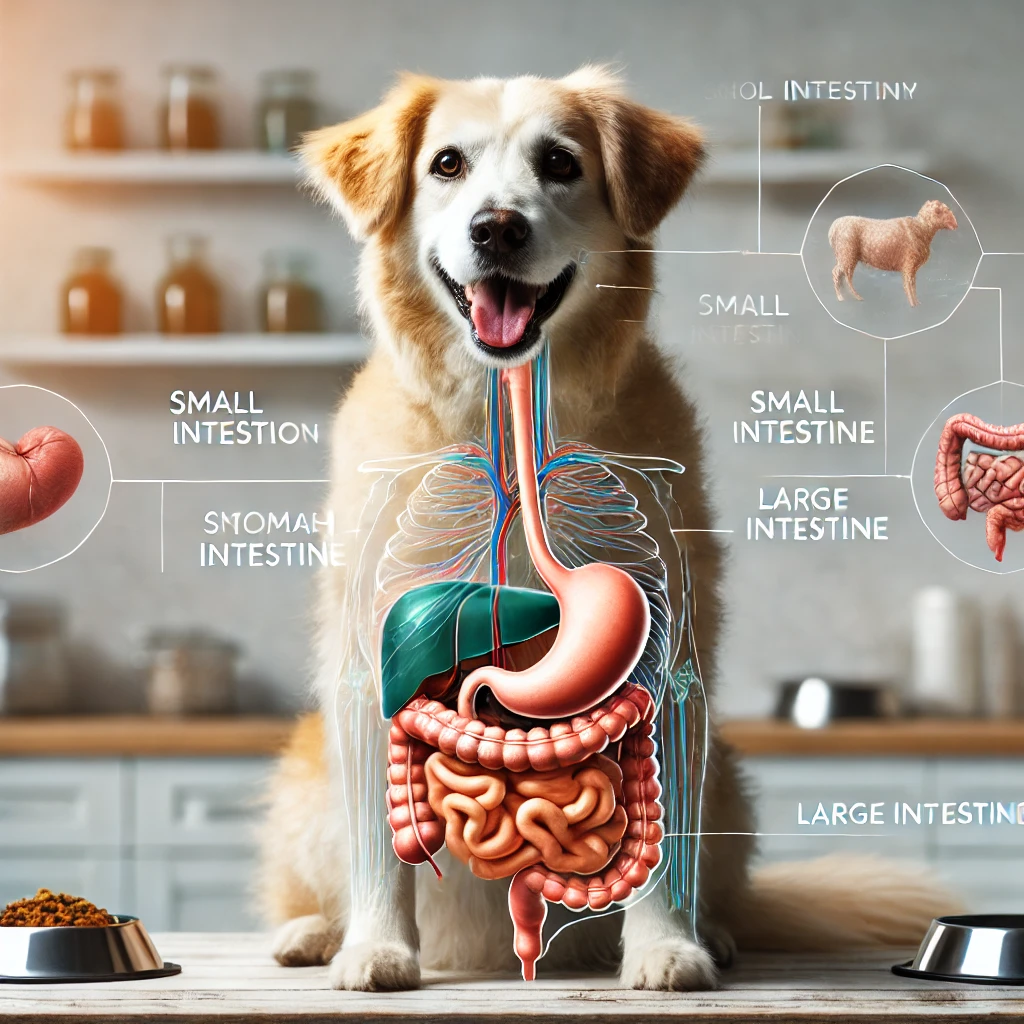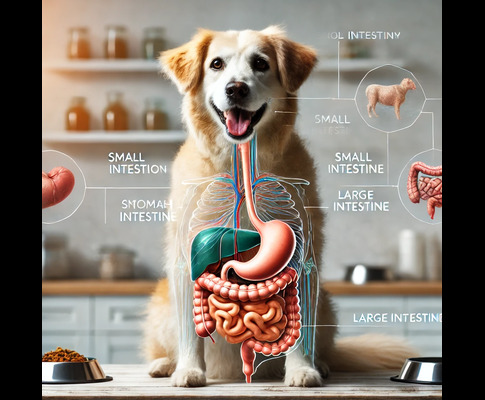Your dog’s digestive health isn’t just about what it eats; it’s about how its body processes food and extracts nutrients to fuel its daily activities. From providing it with the right Best Dog Food to understanding the signs of a healthy digestive system, being informed can prevent issues and improve its quality of life.
The Journey of Food Through a Dog’s Digestive System
A dog’s digestive system is a complex process that begins the moment food enters their mouth.
Stages of Digestion:
- Chewing and Saliva Production: Unlike humans, dogs do not chew extensively. Their sharp teeth tear food into smaller pieces, while saliva begins the breakdown of carbohydrates.
- Swallowing and Esophagus: Food travels down the esophagus and into the stomach through peristaltic movements.
- Stomach: Here, stomach acids and enzymes break down proteins and kill bacteria.
- Small Intestine: Nutrients are absorbed into the bloodstream.
- Large Intestine: The remaining waste is processed, and water is absorbed before elimination.
Factors Influencing Dog Digestion
1. Diet Composition
The type and quality of the best dog food significantly impact how quickly and effectively your dog digests its meals. High-quality dog food with balanced protein, fats, and fiber promotes better digestion.
2. Age and Breed
- Puppies generally digest food faster than older dogs due to their higher energy needs.
- Larger breeds, like Great Dane, may have slower digestion than smaller breeds, such as Chihuahuas.
3. Health and Activity Level
- Active dogs may digest food faster because of their higher metabolism.
- Dogs with conditions like pancreatitis or irritable bowel syndrome (IBS) may experience slower digestion.
How Long Does It Take Dogs to Digest Food?
How Long Does It Take Dogs to Digest Food, but on average:
- Dry Food: Typically takes 8-10 hours to digest due to its low moisture content.
- Wet Food: Faster digestion, usually around 4-6 hours.
- Raw Food: Depends on the type, but it can range between 4-8 hours.
Factors such as the size of the meal, your dog’s activity level, and their overall health can also influence digestion times. If you’re noticing irregularities, it might be time to revisit their diet or consult a vet.

Tips to Support Healthy Digestion in Dogs
- Choose High-Quality Dog Food:
Opt for brands with natural ingredients and avoid fillers or artificial preservatives. - Stick to a Feeding Schedule:
Consistency helps regulate digestion. Feed your dog at the same times daily. - Ensure Proper Hydration:
Always provide clean water, as hydration aids in breaking down food and nutrient absorption. - Incorporate Digestive Supplements:
Probiotics and fiber supplements can improve gut health and support smoother digestion. - Monitor Treats:
Treats are a great way to reward good behavior, but excessive or low-quality treats can disrupt digestion. Stick to the best cat treats or dog-specific treats for quality options.
Common Digestive Issues in Dogs and How to Spot Them
Keeping an eye on your dog’s digestion can help identify potential problems early.
Symptoms of Digestive Issues:
- Vomiting or diarrhea.
- Loss of appetite or sudden weight changes.
- Excessive gas or bloating.
- Constipation or difficulty passing stools.
When to Consult a Veterinarian:
- If symptoms persist for more than 24 hours.
- If your dog shows signs of pain or lethargy.
- In cases of blood in vomit or stools.
Regular check-ups with your vet are essential for maintaining your dog’s digestive health and addressing concerns before they become serious.
Conclusion
Your dog’s digestion is a key aspect of their overall health, and understanding it empowers you to make better choices for their care. From selecting high-quality dog food to providing consistent meals and using treats wisely, every small step contributes to a happier, healthier dog.
Explore a wide range of premium pet supplies at KwikPets, where you’ll find everything from nutritious dog food to supplements and accessories to support your furry companion’s well-being.
FAQs
1. How can I tell if my dog’s digestion is normal?
Healthy digestion typically includes regular eating habits, consistent bowel movements, and no signs of bloating or discomfort.
2. Can the type of dog food affect digestion time?
Yes, dry food takes longer to digest due to its low moisture content, while wet and raw foods digest more quickly.
3. What should I do if my dog has digestion issues?
Start by revisiting their diet and ensuring they’re eating high-quality food. If symptoms persist, consult your veterinarian.
4. Are supplements necessary for my dog’s digestion?
Not always, but probiotics or fiber supplements can be beneficial for dogs with recurring digestive issues or sensitive stomachs.
5. How often should I feed my dog to support good digestion?
Most dogs do well with two meals a day, spaced evenly apart. Puppies or dogs with high activity levels may require three smaller meals daily.
Read More: Why Veterinarians Recommend Angel Eyes Chews for Dogs with Tear Stains
